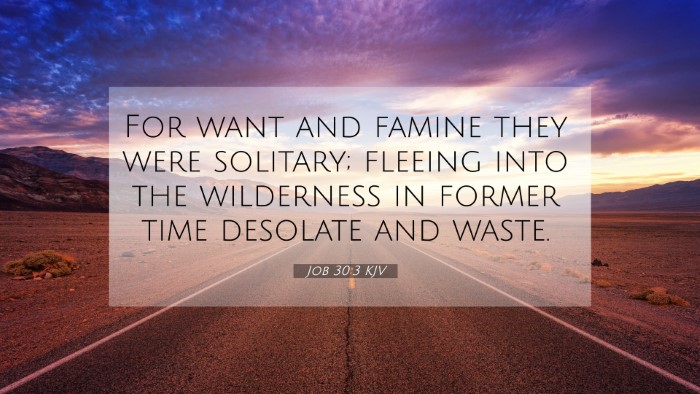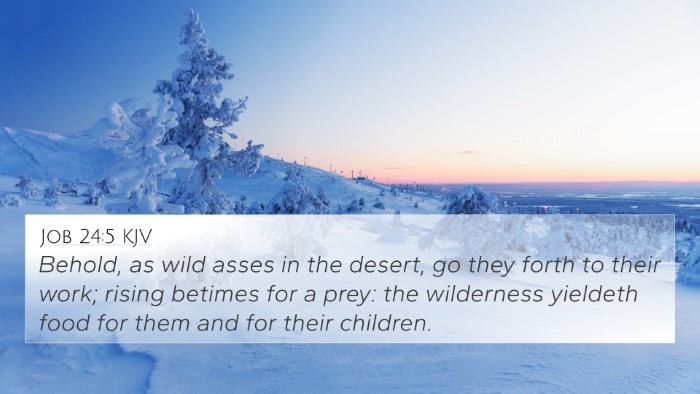Understanding Job 30:3
Job 30:3 reads: “For want and famine they were solitary; fleeing into the wilderness in former time desolate and waste.” This verse captures a moment in which Job reflects on his suffering and addresses the transformation of his circumstances.
The commentary analysis from various biblical scholars provides depth to this verse. Below is a consolidated interpretation based on insights from Matthew Henry, Albert Barnes, and Adam Clarke.
Context and Overview
The Book of Job chronicles the struggles of Job, a righteous man beset by severe trials and suffering. In Job 30:3, he invokes the stark contrast between his former prominence and his current misery.
Verse Meaning
This verse illustrates several critical themes:
- Desolation and Isolation: Job refers to those who were once in great need and became outcasts, highlighting a sense of abandonment that parallels his own plight.
- Famine as a Symbol: The mention of famine can also be seen as a metaphor for spiritual destitution. Job feels deprived not only materially but also of God's presence.
- The Wilderness: Wilderness imagery often represents a place of testing, suffering, and eventual transformation in biblical narratives.
Insights from Commentaries
Matthew Henry's Commentary
Matthew Henry emphasizes the depth of Job’s despair, drawing parallels between the physical ruins surrounding him and the internal desolation he feels. He notes that those who once may have been powerful or well-respected can find themselves in total ruin, which Job now embodies.
Albert Barnes' Commentary
Albert Barnes points out that Job’s lament reflects more than just his personal suffering; it speaks to the loneliness experienced by all those in distress. He asserts that Job’s recollections of being an object of scorn illustrate the shift in societal perception when one falls from grace.
Adam Clarke's Commentary
Adam Clarke discusses the stark realities of Job's social context, as well as the application of this verse in understanding the cyclical nature of fortune and the trials of the righteous. His insights suggest that past prosperity does not guarantee present or future acceptance.
Cross-References
This verse connects richly with other passages in Scripture. Here are notable cross-references:
- Psalms 102:6-7: "I am like a pelican of the wilderness: I am like an owl of the desert. I watch, and am as a sparrow alone upon the house top."
- Ecclesiastes 4:10: “For if they fall, the one will lift up his fellow: but woe to him that is alone when he falleth; for he hath not another to help him up.”
- Isaiah 53:3: “He is despised and rejected of men; a man of sorrows, and acquainted with grief: and we hid as it were our faces from him; he was despised, and we esteemed him not.”
- Lamentations 3:19-20: “Remembering mine affliction and my misery, the wormwood and the gall. My soul hath them still in remembrance, and is humbled in me.”
- Matthew 27:46: “And about the ninth hour Jesus cried with a loud voice, saying, Eli, Eli, lama sabachthani? that is to say, My God, my God, why hast thou forsaken me?”
- Luke 16:20-21: “And there was a certain beggar named Lazarus, which was laid at his gate, full of sores, and desiring to be fed with the crumbs which fell from the rich man's table: moreover the dogs came and licked his sores.”
- 1 Peter 2:12: “Having your conversation honest among the Gentiles: that, whereas they speak against you as evildoers, they may by your good works, which they shall behold, glorify God in the day of visitation.”
Thematic Connections
Understanding Job 30:3 requires recognition of the thematic connections in the Bible regarding suffering, desolation, and redemption. This passage opens conversations about:
- The theme of suffering across the Scriptures— Job’s agonies are mirrored in the life of Christ and the experiences of others in the faith.
- Spiritual famine compared with physical famine, representing a broader human condition.
- The notion of isolation in suffering as depicted in both the Old and New Testaments, signifying the shared experience of humanity.
Tools for Bible Cross-Referencing
For those seeking to delve deeper into connections between Bible verses, consider utilizing the following tools:
- Bible Concordance: A comprehensive resource that lists words and themes, allowing users to find related scriptures easily.
- Bible Cross-reference Guide: A systematic approach to exploring how verses relate to one another.
- Bible Reference Resources: Various tools that facilitate a deeper exploration of interconnected themes within Scripture.
- Cross-reference Bible Study Methods: Utilizing comparative methods to understand theological implications.
- Bible Chain References: Following thematic links across different books of the Bible.
Conclusion
In interpreting Job 30:3, we find a rich tapestry of human experience woven through Scripture. Job's plight resonates throughout biblical texts, encouraging readers to explore the profound connections between verses. By engaging in cross-referencing and thorough analysis, one can uncover deeper meanings and connections within the sacred text.





